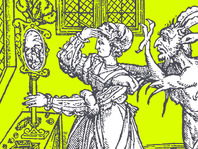C04 Staging Mirrors: Specular Politics in Early Modern English Theatre
Project C04
30.06.2023
Principal Investigator
Prof. Dr. Tobias Döring
Researcher
Valentina Sophia Finger
Project Description
Our project sets out to explore the ways in which social vigilance is engineered, rehearsed, reflected and represented in the culture of the early modern English playhouse.
For such purposes, we argue, mirrors provide crucial instruments whenever they are used as props or tropes on the Elizabethan or Jacobean stage.
In dramatic representation and theatrical performance, mirrors point to processes of policy, control, surveillance and (self-)observation in the larger social sphere while they also offer means and metaphors for the theatre itself. Whether used as an actual stage prop – famously in Shakespeare’s Richard II and Macbeth – or discursively employed as a figure of speech – most notably in Hamlet –, the looking-glass is a specular object to engage with the promise and problem of (mutual) vision, visibility and scopic regimes.
What is more, historical as well as fictional accounts traditionally associate monarchs with mirrors, sovereign figures who are credited with notions of omniscience, omnipotence, and omnivoyance, often also intertwined with occult practices involving glasses and katoptric magic.
In the playhouse, therefore, such mirroring media and mirror moments are not only performed but potentially transformed into metatheatrical models, in turn reflecting the worldly impact of stage action itself.
As a consequence, staging mirrors in early modern theatre may potentially reclaim the charisma of sacred powers with which it enters into mimetic relations of imitation, rivalry and/or alliance.


